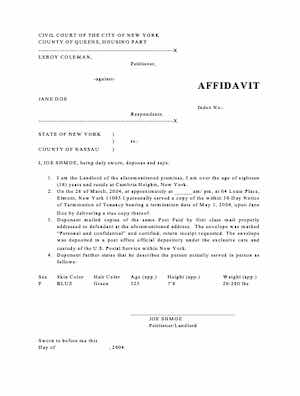What is an Affidavit and What is its Use?

You might at one point in your life have had to execute an affidavit. The first step in the process would be to understand what is an affidavit and what is its use?
An affidavit is a sworn statement by a person (who is called an affiant), made before a person authorized to administer oaths, stating certain facts and information under penalty of perjury. You might have seen movies and TV series depicting witnesses on the stand in a courtroom. A person always says, ‘Do you swear to tell the truth and nothing but the truth?’ An affidavit is similar to witness testimony, except for the fact that an affidavit is in written form. Similar to witness testimony, if you make a false statement in an affidavit, you can be prosecuted for perjury. For this reason, statements made in an affidavit should be truthful and about facts that you have personal knowledge of. What is personal knowledge? Personal knowledge refers to a circumstance or fact, gained through your own senses, something you have seen, heard, touched, smelled, or tasted.
For example, if you say in your affidavit, ‘I heard John say, he had several bank accounts and assets that his wife did not know about.’ You must have personally heard John say this statement. But if you just learned about John’s statement from his friend, Michael, then that statement is false in your affidavit. The correct statement you should say is that ‘Michael told me that he heard John say that John had several bank accounts and assets that his wife did not know about.’ In the first statement, you attest that it is of your personal knowledge that John said such a statement. In the second statement, you attest, not to the statement of John but, to the statement of Michael. The second statement is hearsay with regard to John’s statement and is generally not admissible as evidence because you did not personally hear John say the statement. However, it could be admissible regarding the issue of whether Michael indeed said that statement.
Basic Components of an Affidavit
When you wonder, ‘what is an affidavit,’ you might also be interested in how to write an affidavit. An affidavit has four basic components:
- a statement that you are swearing under oath regarding the truthfulness of the information stated in the affidavit;
- the information being sworn to;
- your signature; and
- the attestation of the notary public or other official authorized to administer oaths.
The first part is as simple as saying, ‘I, (insert name), being duly sworn, deposes and says…” The fact that the document is sworn means that you can be prosecuted for perjury for any false statement stated in the affidavit.
The second part just states the information you would like to attest to as the truth. In the second part, you may state that you are of legal age, being over 18 years old, your residence address, and other facts and information that you wish to set forth as the truth.
The third part is your signature. It is important because it shows that you have read the affidavit and are signing it, knowing that you are declaring the information set forth in the affidavit as the truth.
The fourth part is the attestation of the notary public or an official authorized to administer oaths. The notary public or official attests or witnesses that you, whose name appears in the affidavit, signed such affidavit.
Where the Affidavit Can Be Used
Affidavits have been used in many instances. A process server who serves summons and complaints executes an affidavit of service, which sets forth the manner in which the documents have been served to the other party. In last wills and testaments, a self-proving affidavit of the witness eliminates the need for the witness to come to court to testify that the testator signed the will willingly, of his free and voluntary act, and that the testator was of sound mind, and under no constraint or undue influence. When a vital legal document is lost, such as your passport, some countries require the affidavit setting forth facts regarding the lost document. In certain court proceedings, affidavits are also used in lieu of oral witness testimony, such as in support of written motions.
When signing an affidavit, it is important that you read it carefully to ensure that all the facts stated therein are true and correct to the best of your knowledge and belief. This will minimize any risk of perjury. If in doubt, consult with a lawyer. Should you need assistance, we at the Law Offices of Albert Goodwin are here for you. We have offices in New York City, Brooklyn, NY and Queens, NY. You can call us at 212-233-1233 or send us an email at [email protected].
